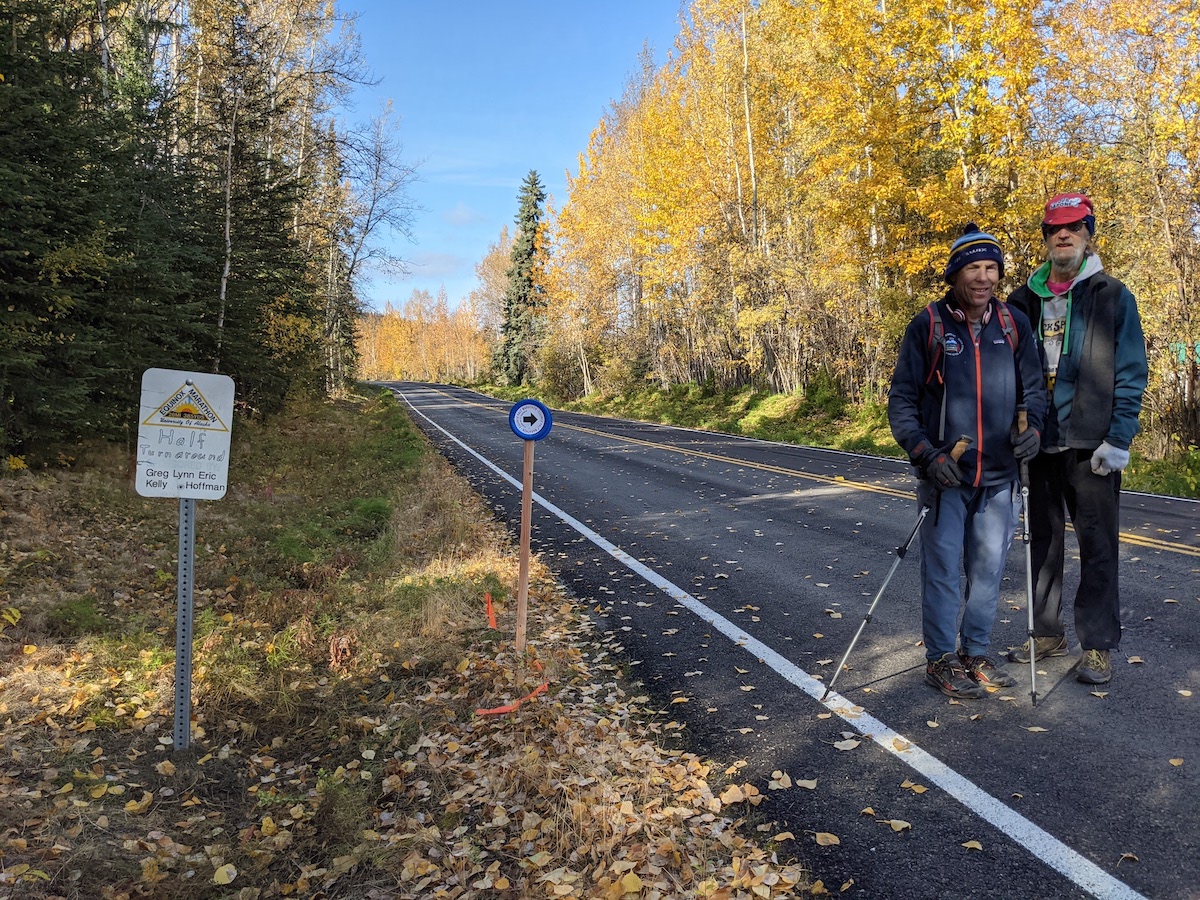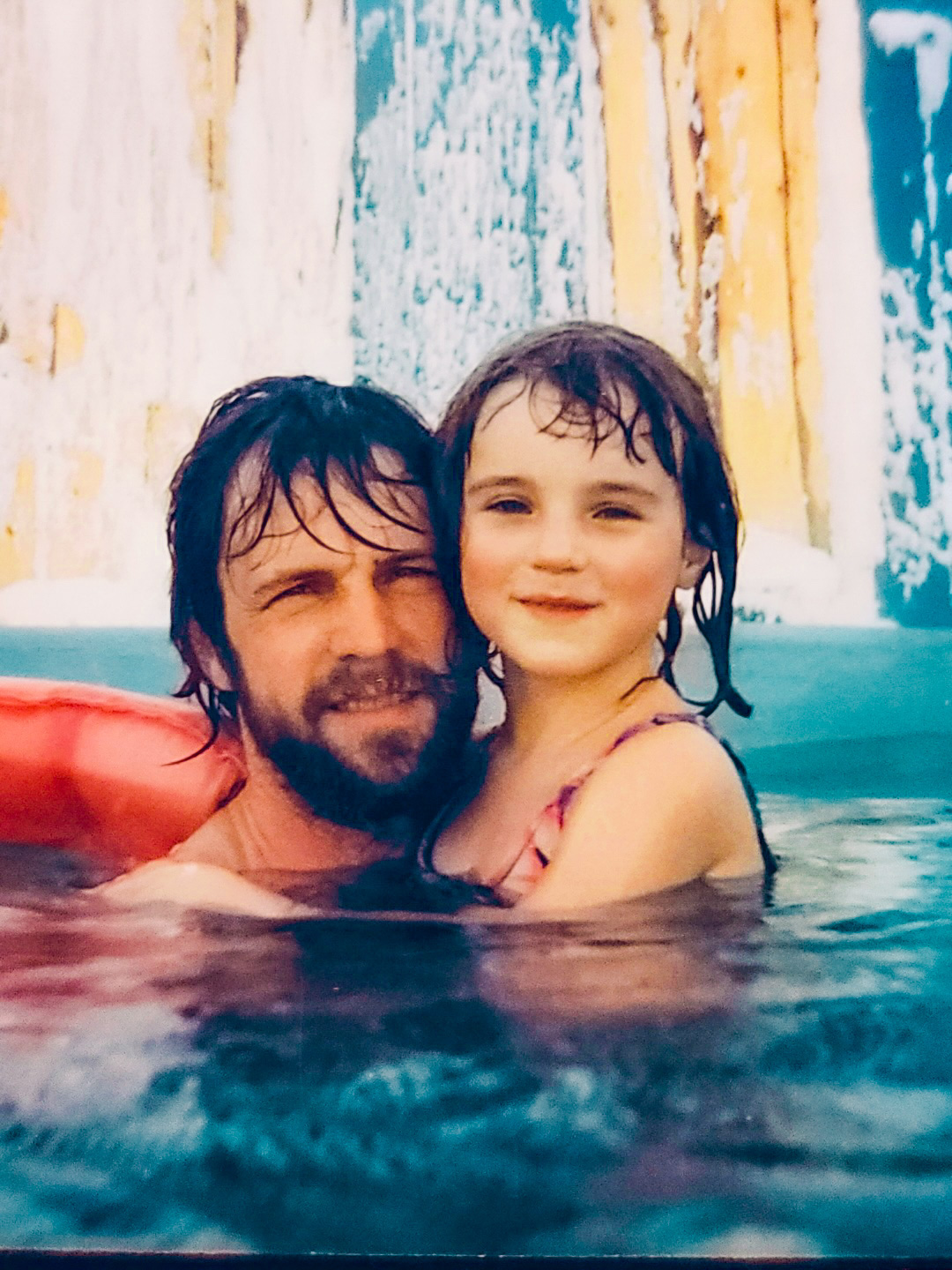Dave Covey made the world a calmer place
Ned Rozell
907-474-7468
March 3, 2022

Dave Covey and Andy Sterns pause at the turnaround point of the Equinox half-marathon in September 2021.
When Dave Covey walked up with a smile, your day was about to become calmer. And then he fixed your irritating computer problem in 10 seconds.
He left us last week — a quiet exit that was totally Dave. He died at 64 of cancer he told few people about.
Dave worked a quarter century at the University of Alaska Fairbanks, lastly as a computer security guy at the Geophysical Institute.
I used to think that’s all he was. Then I learned he was on the UAF running and ski teams, we had stomped some of the same ground in New York, he did computational physics on glaciers and the ionosphere, and he once won a marathon in Anchorage.
In the wedge of the boreal forest in which he made his home, the Equinox Marathon is a 26.2-mile run up and over Ester Dome each September. Dave earned more than 30 triangular knit patches for finishing, several times in the top 10.
I saw him on that hill a few times. One was at the peak of my arc and the slight downslope of his. We finished close to one another; he handed me a cup of sugar water. Another time, later in our running careers, I was pushing my daughter along the course in a Chariot, a stroller with pneumatic tires. Dave was walking along with a woman and her poodle. We chatted while hotfooting the homestretch, that wry smile busting across his face.

Dave Covey stands by his bike and trailer in Mannheim, Germany, during a tour in 2019.
He rode his bicycle to work at the university for a few decades straight. Not to save gas, just because he loved to ride. He toured on bikes with friends through Europe, Australia and Mexico. He always wore one of those cycling caps that Tour de France riders fancied before they used helmets. He really loved beer. And brewing mead.
His voice was soft, laid-back, always punctuated with his laugh. He was from Torrance, California, and first came to Alaska in 1975 as a runner on the UAF cross-country team.
In Fairbanks, he met and married Kelly Drew, a UAF scientist who studies how ground squirrels can do so many amazing things during hibernation, when their bodies get colder than an ice cube. Kelly and Dave had a daughter, Amy, who shares her father’s smile and now has her own son.
Here are some words from a few of his other friends and former colleagues (Dave retired four years ago):
Matt Barkdull shared an office with Dave for about seven years and credits him with teaching him Linux, a Dave favorite.
“There was never a time he couldn't answer my questions,” Barkdull said. “I don't think you could find a more patient, mild-mannered and logical person when approaching a challenge.”

Dave Covey, at left, and Jim Brader stop on the course of the Equinox Marathon in 2016.
Meteorologist Jim Brader started running with Covey in about 1990 and often used Covey’s UAF office as a launching point for trail runs.
“Dave was a mathematical and computer genius,” he said. “He would often come in on the weekends, when he could ‘get some work done’ to assist researchers and maintain the GI computer systems.”
Greg Shipman is head of the Geophysical Institute’s Machine Shop.
“He was a great guy, easy to talk to,” Shipman said. “A fountain of sports chat and someone I could always seek out for technical advice.”
Syun-Ichi Akasofu, 91, is an aurora expert and former director of both the Geophysical Institute and the International Arctic Research Center at UAF. He teamed with Covey on the 1981 study “Magnetic field configuration of the heliosphere in interstellar space.”
“He helped me in computing a 3-D magnetic configuration of the heliosphere,” Akasofu said. “As far as I am aware, no one else has ever made this calculation.”
Jesse Atencio was hired at the same time as Dave, at the institute’s computer center.

Dave Covey and his daughter Amy enjoy the pool at Circle Hot Springs.
“In fall of 2019 I suffered a major stroke and was hospitalized for months in Anchorage,” Atencio said. “Upon my return to Fairbanks Dave made time to shuttle me to and from some doctor appointments and therapy sessions. What a blessing he was! . . . I hope to be able to tell his grandson what a privilege it was to share some time with him. I am a much better person for having him as a friend.”
Dave’s former wife and forever friend Kelly Drew remembered his passion for two wheels.
“If you didn’t have a bike to fix, Dave would build you one, and then fix it if it broke . . . I loved bike touring with him. He never raced ahead without me — instead he would ride along beside me and gently push my bike as we rode up hills together.”
Since the late 1970s, the University of Alaska Fairbanks Geophysical Institute has provided this column free in cooperation with the UAF research community. Ned Rozell is a science writer for the Geophysical Institute.


